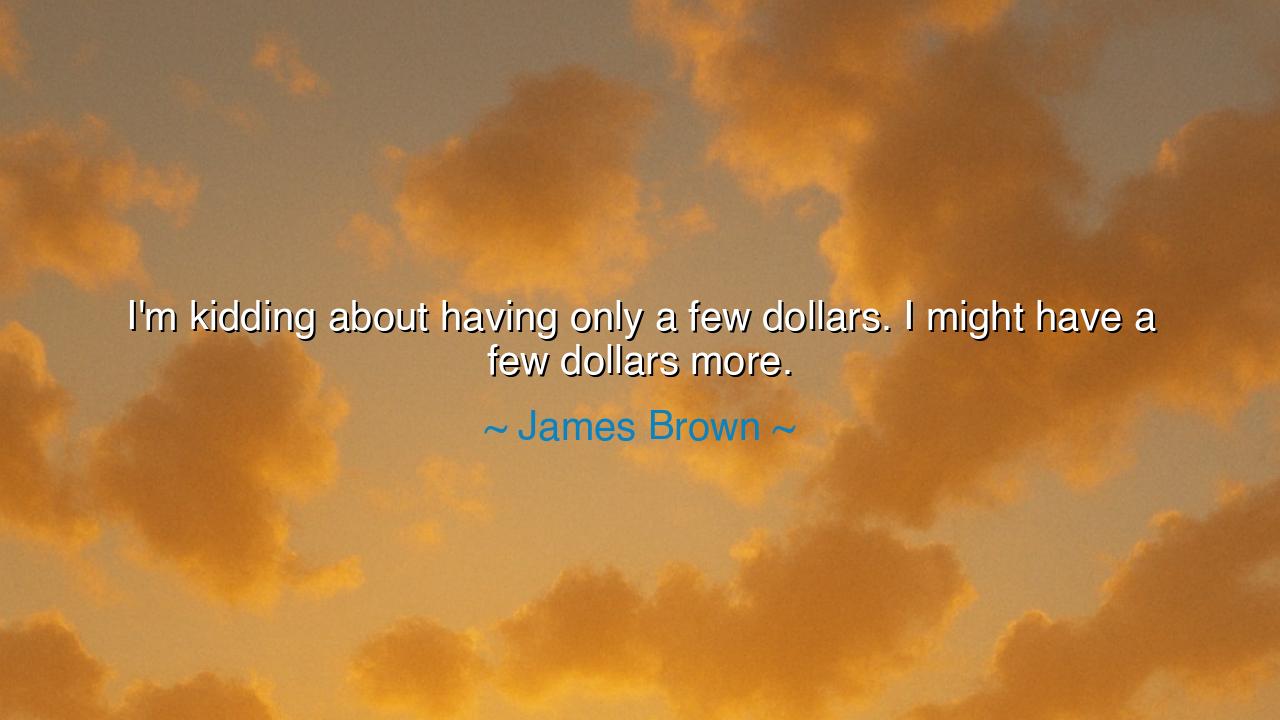
I'm kidding about having only a few dollars. I might have a few






Hear, O Children of Fortune and Struggle, the words of James Brown, a man whose rhythm was as fierce as his spirit and whose words echo with both humor and truth. He speaks, "I’m kidding about having only a few dollars. I might have a few dollars more." This statement, light-hearted though it seems, carries within it the wisdom of a lifetime, the balance between humility and confidence, the art of embracing the struggle while acknowledging the abundance that can arise from it. Let us look closely, for in these few words, the ancient secrets of wealth, not in material gold, but in the riches of spirit, are revealed.
In days of old, the wise men and great leaders often spoke in riddles and metaphors, not to confound, but to open the hearts and minds of their followers to deeper truths. The humble man of the earth, who lives modestly but finds treasures in the simple joys, is often the wealthiest of all. James Brown, though he lived a life far from simple, understood this truth well. His words reflect the playfulness of life’s uncertainties. "A few dollars," he says, but how many of us have heard the phrase and understood it to mean far more than the material? Brown wasn’t simply talking about money; he was speaking to the heart of what it means to exist in the world: to strive, to work, to laugh at the struggle, and to always know that more is just on the horizon.
In truth, the wealth Brown speaks of is not always in material gain but in the joy of the journey, in the power of persistence, and in the willingness to keep moving forward, no matter the setbacks. For James Brown, money was never the end, but a means—a means to express his soul, to share his gifts, to lift himself and others up. This philosophy echoes the teachings of many ancient leaders, such as Alexander the Great, who amassed wealth not simply to hoard but to enrich the lives of his people, to fuel his campaigns, and to create a legacy. Money was but one tool in his arsenal; the true treasure was his influence, his vision, and his will.
Consider, too, the story of King Midas, who wished for gold beyond measure, only to find that his desire turned into a curse. He could not eat, he could not touch his loved ones, for everything he turned to gold. His greed became his undoing. In contrast, James Brown’s words remind us of the lightness that comes when we release the tight grip on our desires and acknowledge the ebb and flow of life’s fortunes. To admit, with grace, that one might have "a few dollars more" speaks to the acceptance of life’s changing tides. It teaches us that humility and gratitude are the true markers of wealth, not the accumulation of possessions.
The lesson we take from Brown’s jest is twofold: First, it is a reminder that material wealth is not the measure of a man’s worth. Wealth can be fleeting, but the soul’s richness—that is what lasts. Second, it is a call to embrace the lightness of spirit, to know that though we may struggle, the rewards of perseverance are great. In the words of the ancients, "He who is content with little is richer than he who desires much". Brown embodied this paradox: in the laughter of his struggles, he found his freedom.
In our own lives, O Seekers of Truth, we are called not to clutch desperately at the fleeting rewards of material gain, but to stand firm in the knowledge that our spirit cannot be bought or sold. Work, yes—strive, yes—but also enjoy the dance of life. Know that a few dollars more may come your way, and with them, more joy. But whether it comes or not, you are not defined by it. Instead, you are defined by how you carry yourself, by the richness of your character, your actions, and the generosity of your heart.
So, as you walk upon this earth, remember the lesson of James Brown: laugh at your struggles, keep your heart light, and remember that wealth is a matter of perspective. Rejoice not in what you have, but in who you are, and in the legacy you leave through your laughter, your gifts, and your ability to find joy even when the road is difficult. For in the end, it is not the dollars that define you, but the spirit with which you move through the world.






AAdministratorAdministrator
Welcome, honored guests. Please leave a comment, we will respond soon